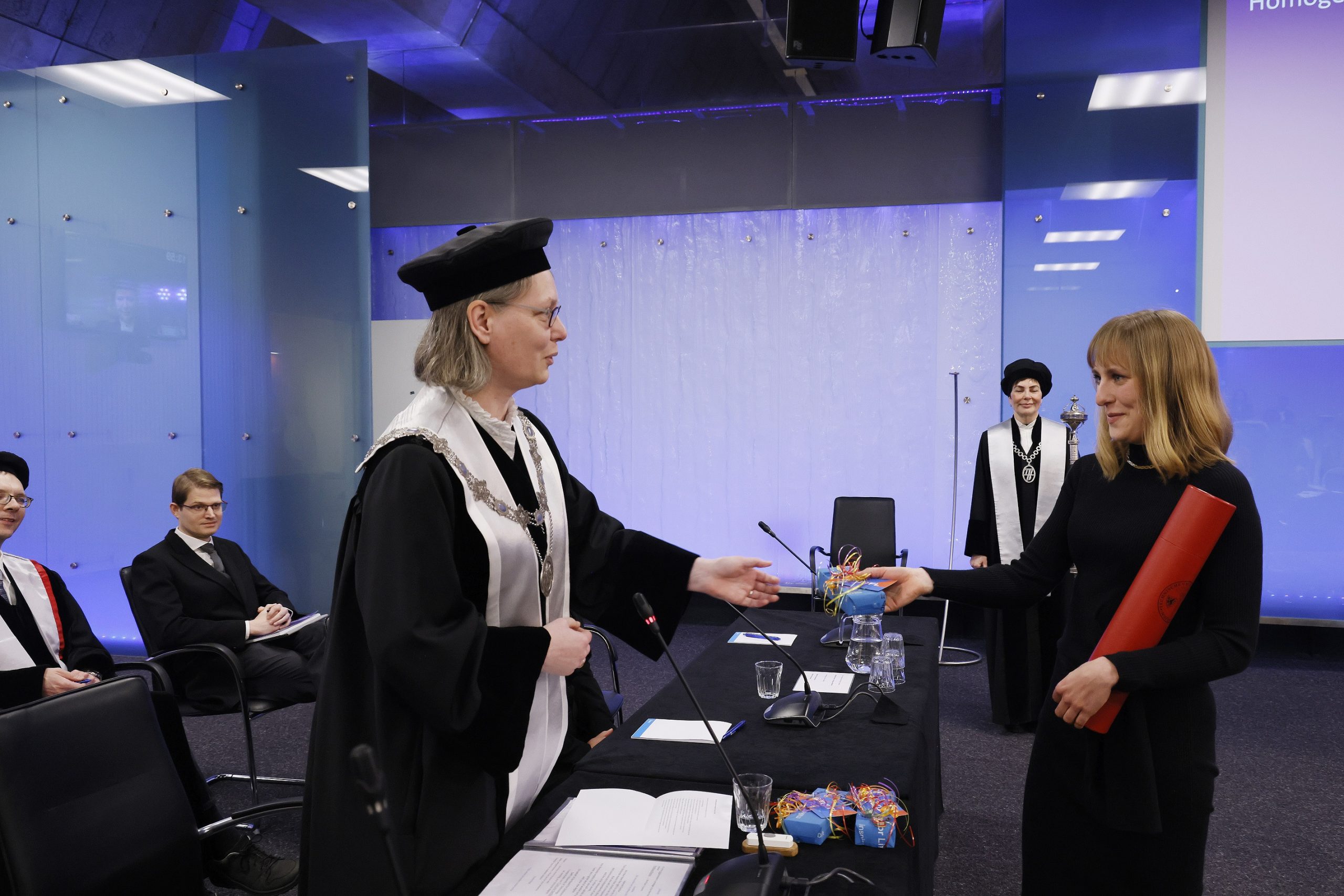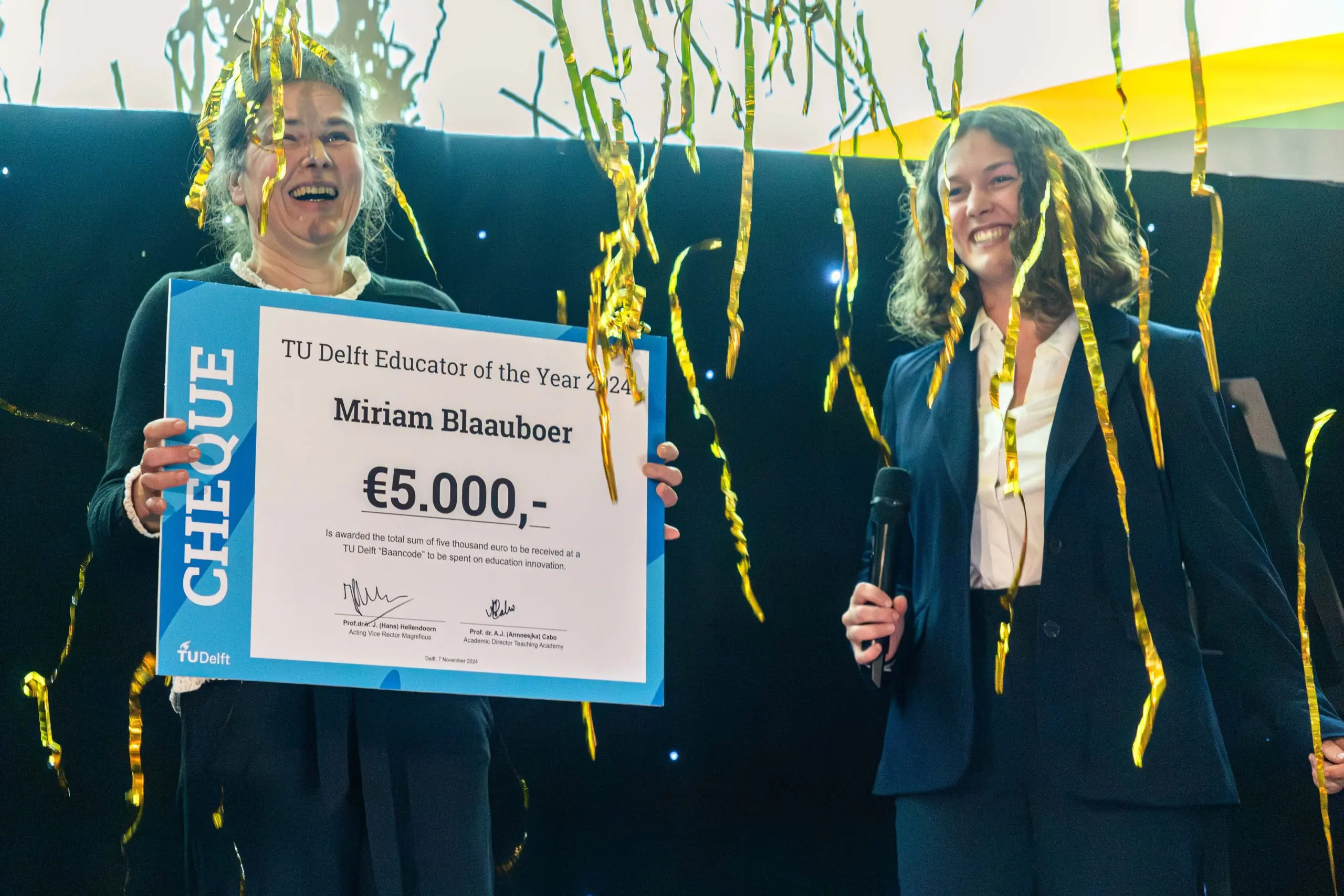Short news
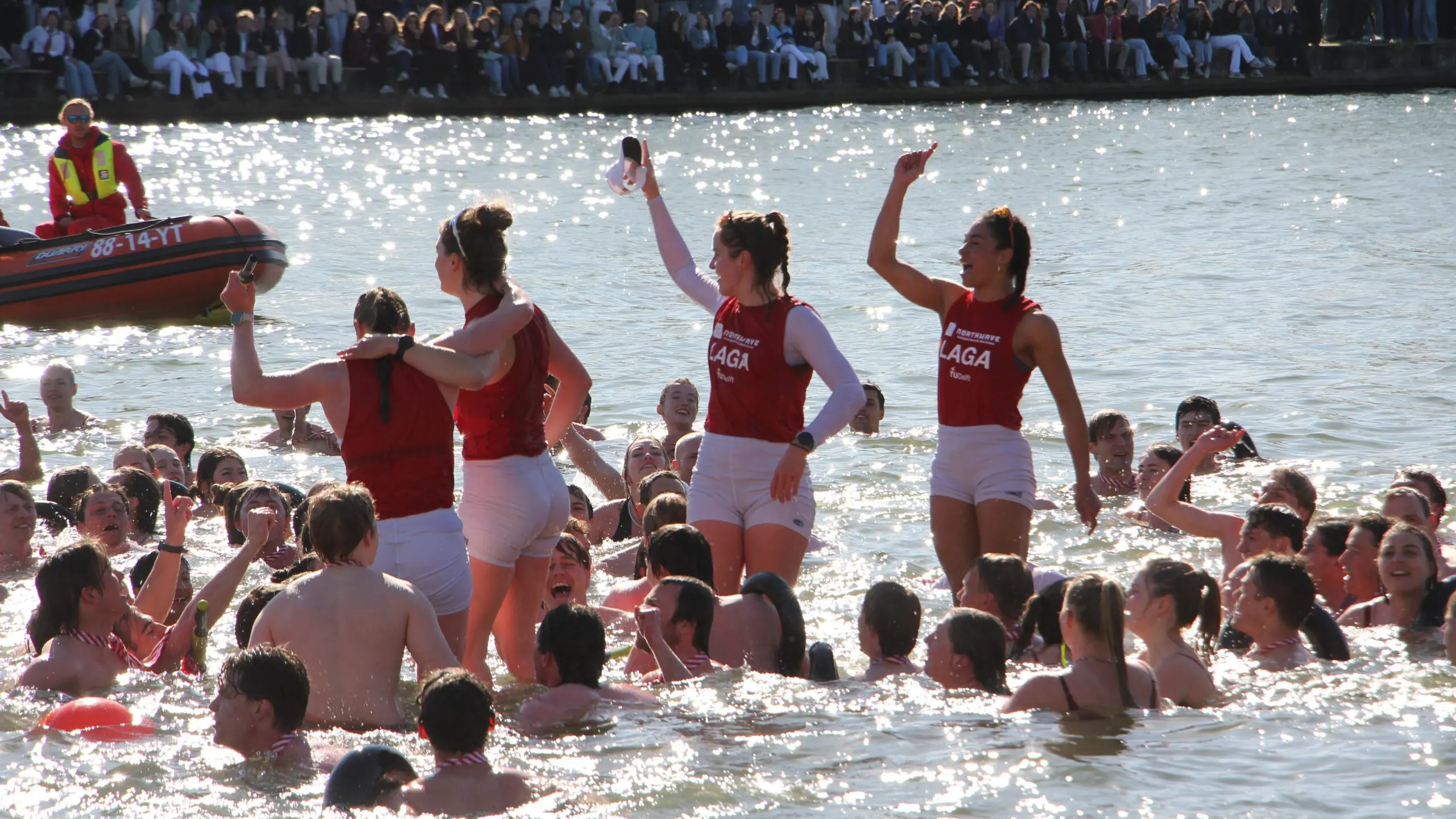
After 28 years of manifesting with the slogan ‘Laga wins the Varsity!’, D.S.R.V. Laga finally celebrated victory on Sunday at the Amsterdam-Rhine Canal in Houten. The honor went to the women, as the Laga men did not make it to the final. The Varsity is regarded as the most prestigious rowing race in the Netherlands. This was the first time the corporate student rowing association won with the women’s boat.
The powerful strokes from Tessa Dullemans, Willemijn Mulder, Lotte Jansen, and Laila Youssifou quickly propelled the Laga boat to the finish line. The boat was the favorite, with Dullemans and Youssifou having already won silver medals for the Netherlands in the double four at last summer’s Olympic Games in Paris. Mulder had been part of the team as a reserve.
Significant lead
It was not close: with a time of 07:16.63, the Laga team had a comfortable lead of 14 seconds over the Skøll boat, which finished second. More than a hundred Laga members jumped into the canal – some in their underwear or just wearing their ties – to congratulate the rowers.
In the men’s “Oude Vier” (Old Four), still the main event of the Varsity in 2024, the Amsterdam rowing club A.A.S.R. Skøll won for the first time ever. On board were Jan van der Bij, Olav Molenaar, Wibout Rustenburg, Mats van Sabben, and coxswain Lotte Vedel. The Proteus men finished in third place.
Want to watch it again?
You can relive the experience with the livestream of the 2025 Varsity on YouTube. The official results page can be found at Time-Team.
The Bachelor’s degree in Earth Sciences at the Free University (VU) will disappear if it is up to that university. As a result, 37 employees risk losing their jobs. Some students may have to find another programme, they were told last Thursday.
The decision is an austerity measure. In the past year, the university announced millions in budget cuts. As a result, the bachelor’s programme in Earth Sciences will have to be discontinued by September 2027, as will one of the tracks of the subsequent master’s programme in Earth Sciences. Other universities, including TU Delft, are also having to tighten their belts.
The bachelor’s programme attracts fewer and fewer students and has become too expensive, says dean Aletta Kraneveld in Ad Valvas, the VU’s independent journal. The decision is not yet final; it still has to pass the representation bodies. VU is currently discussing with Utrecht University whether students can take courses there. Utrecht is home to the only other Dutch-language earth science programme in the Netherlands.
More technical angle in Delft
At TU Delft, until this academic year, students could enroll in the English-language bachelor’s programme Applied Earth Sciencies, which has a more technical angle than its counterparts at VU and UU. But from September 2025, that Delft programme will no longer exist with that name. It will be renewed and continue under the name Earth, Climate and Technology. That choice was made to better incorporate contemporary societal challenges into the curriculum.
VU is not the first university to scrap entire sections due to a need for budget cuts. For example, the Zeeuws University College, part of Utrecht University, recently announced it was downsizing by a quarter. At the University of Twente’s Faculty of Applied Sciences, eight departments are disappearing. What the cuts will look like at TU Delft is not yet known.
HOP, Olmo Linthorst/Delta, Kim Bakker
International students in Delft don’t immediately pack their bags once they have their Dutch diploma. Five years later, nearly four in ten are still in the Netherlands. Only international students in Eindhoven tend to stay more often. Nationwide, around 30 percent remain after five years, according to a new report (in Dutch) from the internationalisation organisation Nuffic.
In Delft, the percentage is higher: 38.7 percent of international students in Delft still live in the Netherlands five years after their graduation date. Not just Delft students, but technical internationals in general tend to stay often. With 49 percent still living in the Netherlands after five years, Eindhoven tops the list.
The research by Nuffic shows that especially non-European students stay. They cite employment opportunities as a key reason for staying. 80 percent of them have a paid job, most often in and around Amsterdam, in the Delft/Rotterdam/The Hague region, Utrecht, or Eindhoven.
More students registered
The share of students staying in the Netherlands is slightly higher than in previous studies, but this doesn’t necessarily mean that internationals are staying more often. Researchers have better visibility of internationals because they are registering more frequently than before with the municipality where they live. If this is accurate, the so-called stay probability of students might previously have been underestimated, Nuffic says.
The fact that so many international students stay in the Netherlands is profitable, say economists. It contributes an estimated 1.5 billion euros per year to the national treasury. However, the government wants to reduce the number of international students coming to the Netherlands. One of the ways they aim to achieve this is by offering fewer English-taught and more Dutch-taught bachelor programs. For now, this has no direct impact on TU Delft.
Tian Qing Yen (Applied Sciences) won the grand prize in TU Delft’s Open Photo Competition with her photograph Moving Spaces. Her photo depicts the tension between freedom and restriction. The winning photos were announced during the Open Education Week 2025.
Other winning entries included TU Delft Library by alumnus Carel van der Lippe (Electrical Engineering), The Observer by PhD candidate Jonas Leander von Heusinger (Aerospace Engineering), and Abstract Utility by master’s student Krishna Koushik Venigalla (Architecture).

The Open Photo Competition was initiated by Bea de los Arcos, Learning Developer at the TU Delft Extension School. The competition aims to introduce participants to the concept of openness in an accessible way: the free sharing of images, the importance of proper attribution, and the reuse of materials. The submitted photos will be added to a public image bank, freely accessible to all. This year was the fifth edition.
- All submitted photographs can be viewed via the online photo album ‘We Like Sharing’ on Flickr.
Dutch universities awarded 5,595 PhDs over the last academic year – more than ever before. Women have maintained their lead over men.
In the 1990s, almost all dissertations were written by men. That has gradually changed, with more and more PhDs going to women.
The turning point came in the 2020/2021 academic year, when, for the first time, more women than men earned their PhDs. Over the past two years, women have pulled ahead: 52% of new PhD holders are female.
In healthcare-related PhDs in particular, women outnumber men. However, men still outnumber them in mathematics, natural sciences, and engineering.
That’s also the case at TU Delft. According to Graduate School records, 448 PhD defences were don there last year – ‘a record year indeed’. Of these, 149 were women, while 299 were men.
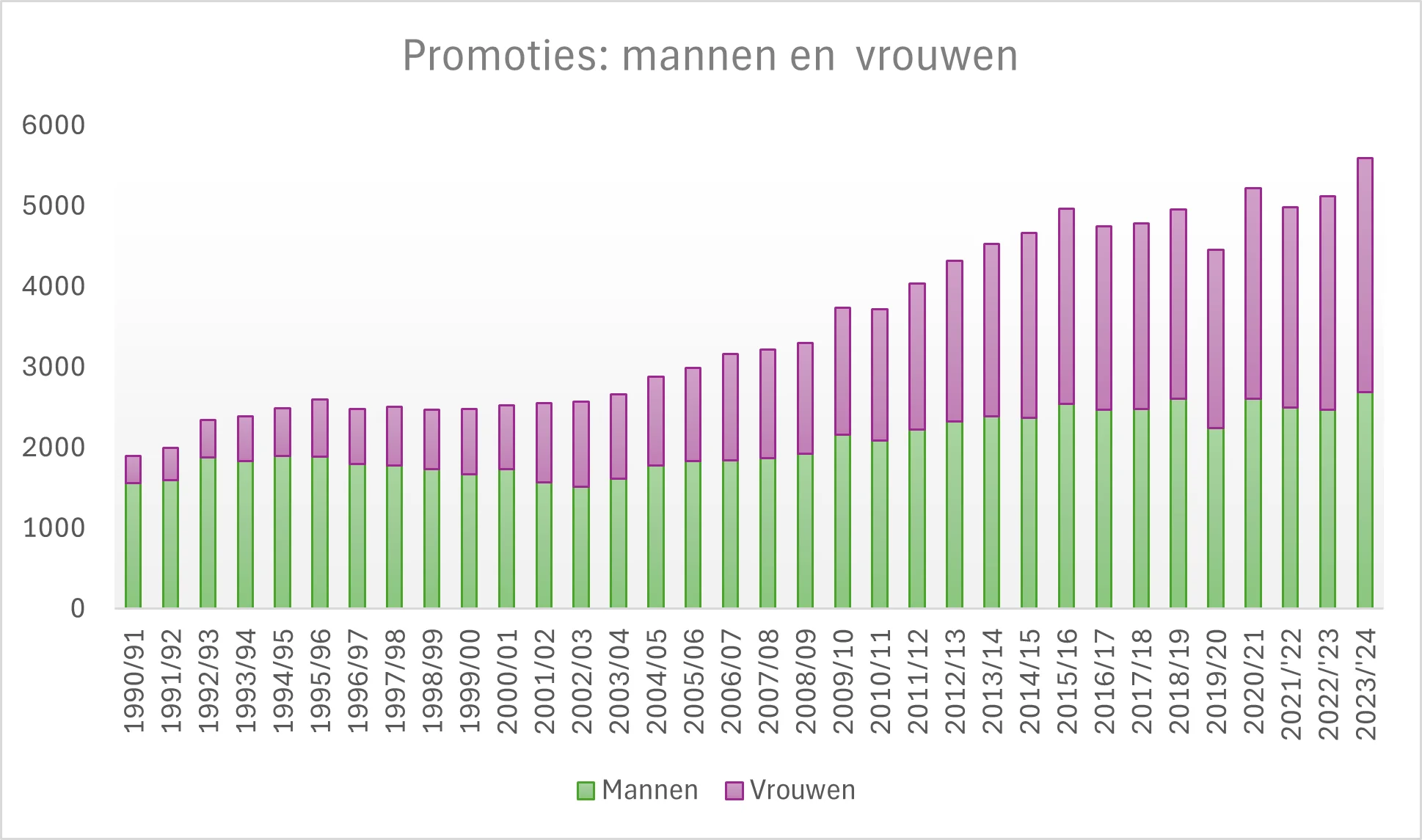
The number of PhD graduates has been rising since 2009. At the time, then-Minister of Education Ronald Plasterk raised the ‘PhD bonus’, making it more financially attractive for faculties to guide PhD candidates to completion. That bonus now stands at around EUR 80,000 per approved dissertation.
HOP, Bas Belleman
Datasets disappearing, funding cuts, American colleagues too afraid to answer the phone – many stories are circulating about the consequences of the new US science policies. How are researchers in the Netherlands experiencing the impact of the Trump administration?
Investigative journalists from different Dutch media outlets are working together to uncover the concrete effects of US policy on researchers in the Netherlands. These are investigative platform Investico, De Groene, NU.nl, the Higher Education Press Agency (HOP), to which Delta is also affiliated.
HOP, Bas Belleman
Want to help?
- Do you work in academia and want to contribute? You can help by filling out a short survey (5 minutes).
- The survey is in English, but open-ended questions can also be answered in Dutch. Your details will only be used for verification and will never be published without your permission.
This survey will provide a more complete picture
Recently, the Royal Netherlands Academy of Arts and Sciences (KNAW) asked its members similar questions and has fully endorsed this investigation.
President Donald Trump has signed an order aiming to eliminate the Department of Education. According to the US President the department is wasting billions of dollars. He wants education to become a matter of individual US states again, as it used to be.
This affects, among other things, US student funding. Trump believes that the ministry should not handle ‘banking matters’ such as debt and wants to transfer this to ‘an entity that can serve American students’.
The total student debt currently stands at $1.6 trillion. Student debt is a problem in the US anyway. Democrats wanted to cancel debts, but Republicans did not.
Permission
Trump has yet to get formal permission from the US Congress to actually abolish the ministry, but until then he can already downsize the department substantially.
The ministry has existed since 1979, when Democratic President Jimmy Carter was in power. Carter turned 100 and was just able to vote in the last election. He was an outspoken opponent of Trump, who is now giving him a kicking: he suggests that Carter created the department only to gain support from the largest US education union.
Equal opportunities
The department not only regulates student funding but also deals with equal opportunities and non-discrimination. So the blow is harder for groups of pupils and students who already have a harder time in education, for example those from poorer families. (HOP, BB)
On Tuesday evening, a big fire broke out at a house on Nieuwstraat in the centre of Delft. Around midnight, the fire was largely under control, but the fire brigade expects to be busy for hours with debris clearance.
The fire started around 20:30 in an upstairs unit on the Nieuwstraat and quickly spread to several upstairs units, as well as two premises on the Wijnhaven, reports the Haaglanden Safety Region (in Dutch).
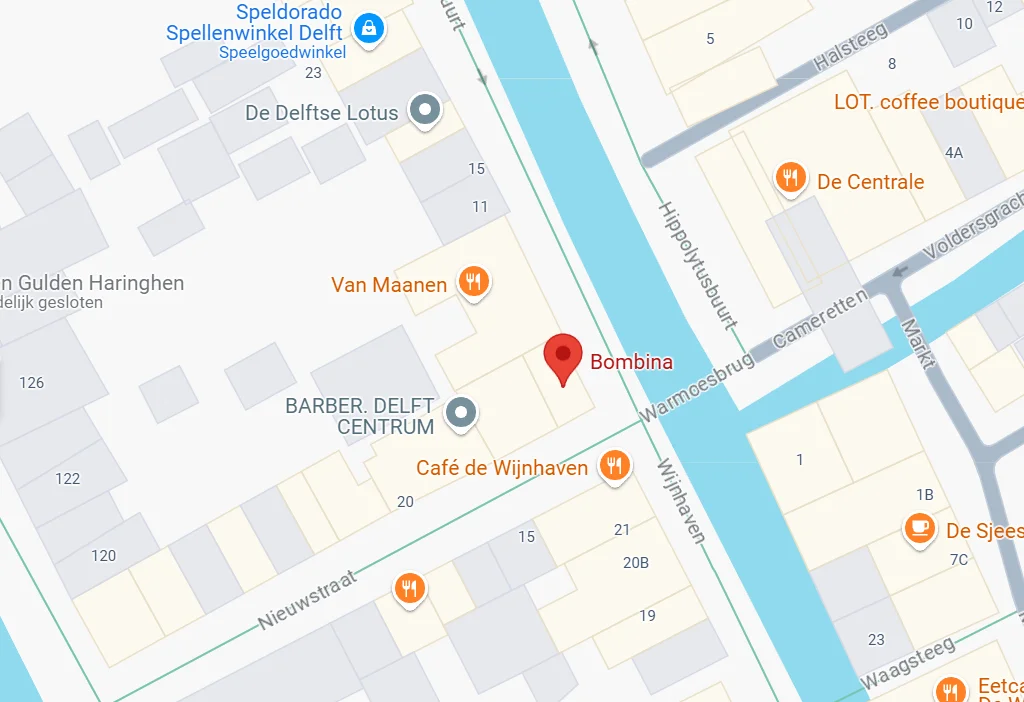
Due to the smoke, local residents were advised to keep windows and doors closed. The Nieuwstraat was also closed due to possible collapse danger. The fire brigade is taking into account that one of the buildings could still collapse.
For the time being uninhabitable
One person was injured in the fire, this person was taken to hospital with unknown injuries. In addition, the fire brigade managed to rescue two cats from the premises during the extinguishing work.
The affected houses in the Nieuwstraat and Hippolytusbuurt are badly damaged and uninhabitable for the time being. Adjacent shop premises and houses also suffered damage. About ten residents had to leave their homes. They were initially accommodated in Delft city hall and spent the night in a hotel.
The Delft Hyperloop team was named the winner of the KIVI Engineering Student Team 2025 award last week and also took home the Audience Award. The award ceremony of the Royal Society of Engineers (Kivi) took place on Wednesday 12 March at The Hague University of Applied Sciences, in the presence of Princess Beatrix, Princess Mabel, and Kivi President Jacolien Eijer-de Jong.
“We hope that the Kivi Engineering Student Team Award will give Delft Hyperloop a boost to continue their leadership in international hyperloop development,” said the jury. “Their passion for technology and sustainability is evident in their work, and they serve as an inspiring example for other students.”
The Kivi Engineering Student Team Award was established in 2022 to recognise student teams that excel in teamwork, innovation, societal impact, and technical expertise. The goal is to encourage future engineers and draw attention to their innovative projects. The other finalists were University Racing Eindhoven (TU Eindhoven) and Solar Boat Twente (University of Twente).
Founded in 2016, Delft Hyperloop has established itself as a pioneer in hyperloop development – an innovative transport system that could transform the future of mobility. This year, the team’s goal with Hyperloop 9 is to become the first student team ever to demonstrate a scaled-up hyperloop system at European Hyperloop Week (EHW), the world’s largest hyperloop competition.
Four lecturers have been nominated for Lecturer of the Year 2025: two from a university and two from a university of applied sciences. The winner will receive a grant of 25 thousand euros for educational innovation. It is the eleventh time that the prize will been awarded.
One of the contenders is from TU Delft: dr. Miriam Blaauboer (Applied Sciences). She was elected TU Delft’s lecturer of the year in November 2024, which automatically gave her a chance to win the national nomination.
Blaauboer has been involved in teaching for 15 years, contributing to both the bachelor’s and master’s programmes in Applied Physics. Her standout courses include the Honours Class on Electromagnetism for bachelor’s students and Fundamentals of Quantum Information in the new MSc programme on Quantum Information Science & Technology (QIST).
Her nomination highlights her teaching style as follows: ‘Miriam stands out as an educator thanks to her crystal-clear explanations, sparkling enthusiasm, empathy towards students, and disarming friendliness. She delivers her lectures with such energy that it inspires students to dive deeper into the topics.’
Connection
The other nominated lecturers are Menno Otten (Amsterdam University of the Arts), Farid Boussaid (University of Amsterdam) and Anna Posthumus Meyjes-de Breij (Leiden University of Applied Sciences). The election is organised by the Dutch National Students’ Association (ISO) and the Comenius network of innovative lecturers. The jury includes students, lecturers and last year’s winner: Peter Pelzer from Utrecht University . The award ceremony will be held in Nieuwegein on 7 April.
The Comenius network was founded in 2018 and now has more than six hundred members from vocational secondary, higher and university education. They can become a member through prizes and education grants, but for a few years now it has also been possible if you write a good motivation letter.
This time, in the judging, extra attention will be paid to ‘socially oriented thinking’. “At a time when opinions differ, it is precisely teachers who can provide connection in the classroom,” says ISO president Mylou Miché.
HOP/Bas Belleman, Delta





